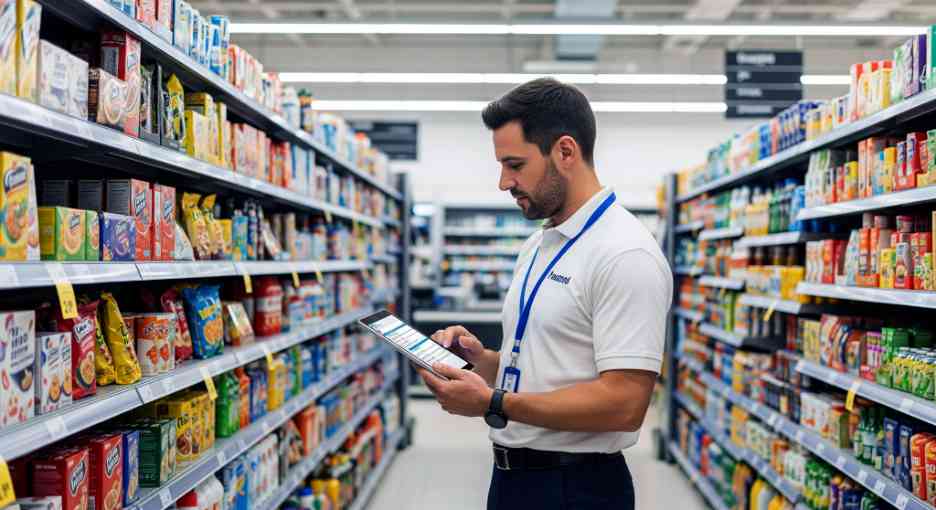Try appreciating the often-forgotten members of the retail front-the field representatives. These members constitute the vital line of defense for brand champions and problem solvers. The days of field representatives go by in a whirl of store visits, inventory checks, and the endless task of keeping products ideally placed. For years, this was a manual grind. But what if there was a better way? What if this new powerhouse tool could lift some of the tedious work off their plate, allowing them to focus on what they do best: build relationships and sell? This is the core idea behind IR FMCG, a powerful new application of technology that is fundamentally changing the game. This article will show you how fmcg image recognition is transforming the field rep’s job from a chore into a mission of strategy and human connection.
Beyond Automation: A New Era for Field Reps
For decades, the field rep’s job was a data collection marathon. They would walk aisles with a checklist and a clipboard, physically counting products for stockouts, checking on stockout instances, and making sure that the planogram–a detailed map for the shelving location of every single product–was correctly implemented in store. It was not only slow but error-prone. A tired rep might miss a single missing item or miscalculate a shelf-share percentage. These minor, daily errors added up to huge gaps in data and missed opportunities. Today, we’re seeing a shift. The future of field sales isn’t about replacing the human element; it’s about augmenting it. AI-driven image recognition is stepping in as a swift and accurate partner, taking on the painstaking work of auditing so reps can focus their energy where it truly matters.
The Evolving Role of the Field Rep
The modern field rep is a strategist, a negotiator, and a trusted advisor. The job changes from being just the eyes and ears of the company to becoming a true partner of the retailer. They no longer just check boxes but instead locate opportunities. A human can walk into a store, have a chat with the manager, and use intuition to understand the market at a local level. They develop a kind of trust that no algorithm can provide; this is why they’re irreplaceable. The logistical side or data gathering of the job is, indeed, an important key piece, but it is just one piece. By taking away some of that piece through the AI-powered image recognition FMCG tool, the reps can free up their time for high-impact tasks that require the emotional intelligence and immediate problem-solving skills that only a person can offer.
The Power of the “Digital Eye”: How AI Streamlines Operations
How does this magic really work? For the rep, this part is very easy. All one has to do is pull out a smartphone or tablet, point it at product shelves, and snap a photograph. That is when an advanced algorithm kicks into action. Having a digital eye with superhuman vision, the software goes to analyze every bulk of an item: it identifies the products, counts stock, and flags issues such as out-of-stocks, unjust prices, or weak placements. Processing the information within a few seconds, it sends all this data to the rep’s device for an objective real-time picture of what is going on on the shelf. Now the rep can speak to store management armed with concrete, absolute data, thus indeed a competitive advantage for any consolidation of potential issues or opportunities. That is our new normal, and this disrupts the industry. If you’re curious about how AI is also transforming marketing strategies, check out our article on SEO in the Age of AI: Becoming the Trusted Answer.
Faster, More Accurate Store Audits
Say a rep used to spend about 30 minutes auditing everything in a particular aisle. The same would now happen in a matter of a minute or even less-by snapping a few photos and allowing the system to analyze everything automatically. That is a tremendous jump in efficiency from what can be called a minor improvement. According to those companies that utilize this technology, they report an astounding near 100 percent accuracy level in their audits, much beyond that achievable by any manual effort. Such consistency and accuracy in the data going back to corporate levels enable them to make better business decisions. A typical IR solution for FMCG aims to get rid of the boring, monotonous work that would wear people out through exhaustion and fatigue. Now reps can do more stores a day, thus giving them a larger footprint to impact. The old way of doing things is a relic of the past, and this is a shining example of how technology can make us more productive, not replace us.
Instant Competitive Intelligence
A significant part of any field rep’s job is understanding what the competition is up to. Is a rival brand running a new promotion? Did they snag a better spot on the shelf? In the past, this was a manual observation task, and often reps only found out days or weeks later. An image recognition FMCG system changes all of that. From giving a mere glance at a competitor’s section, reps get a ton of immediate information-failed shelf share, pricing strategies, or promotional displays. It is this real-time information that enables the reps to come to a store manager with an informed discussion on marketing or strategic placements by stating, “Why don’t we do a counter-promotion to what they are doing?” With such agile countermeasures from changes in the market, this becomes a huge competitive advantage. Having such information at their finger tips allows reps to go from being reactive observers to proactive strategists.

Reclaiming Time: The Human-Centric Benefits
This is where magic starts to really happen. Image recognition for FMCG turns around by lifting off the data collection duties from reps, so they are able to reclaim what is truly valuable: time. What does this newfound freedom allow them to do? They get to be better at what they are supposed to do. They become true salesmen and relationship builders instead of glorified data entry clerks. From short, word-of-mouth, transaction-oriented visits, they can now have longer, enriching talks on the specific needs of a store with store managers, hold talks on inventory problems, and work on joint solutions.
Building Deeper Relationships
- Ask yourself: Would a rep have ever considered spending more time on the floor, absorbing the store’s rhythm and becoming familiar with its customer peculiarities-who thus-became partners instead of being just another vendor? This relationship-centric approach would then be a vehicle of delivery much-actualized by AI grovelers. Some things that can be done because of that extra time include:
- Strategic Planning: Collaborating with store managers to optimize product placement and promotions.
- Problem Solving: Having to sort out on-the-spot issues needing a human touch, such as a display set up incorrectly or a few items being mixed up somewhere in the logistics chain.
- Training & Education: Investing time in training store staff on the benefits of new products and promotions.
- Trust Building: Fostering a sense of partnership and shared goals, rather than merely collecting data.
Increased Sales and Job Satisfaction
Cash registers echo a heavy time reclamation effect at the lower line. A little time to relate with clients and turn their sales strategy into something more fruitful does good to performance metrics, which translate to more revenue and a bigger brand presence. But the added bonuses aren’t just for the company; they stand for the sales representatives, too. When you are able to work on the most rewarding and strategic parts of your job, job satisfaction skyrockets. In other words, reps feel like their work and strategic inputs into the company matter, and so do the real interpersonal connections they build with their clients rather than being viewed as just another cog in a big machine. That feeling of purpose and impact will stay with you and truly is priceless.
Conclusion: The Future of Field Sales is a Hybrid Model
The narrative that AI will replace human jobs is far too simplistic. The real story is one of partnership. The most successful FMCG image recognition implementations aren’t about removing people from the equation but about making them better, more effective, and more valuable. On the other hand, AI combines speed and accuracy, while the human field sales rep brings in the sublime powers of communication, negotiation, and empathy. The future of field sales is supposed to be a hybrid in which technology acts as the ultimate wingman, carrying out the boring and repetitive chores so that the sales rep can spend less time on administration and more time doing what he was hired for. So being a field sales rep does not end; it just brings in a more strategic and rewarding, and effective career.
